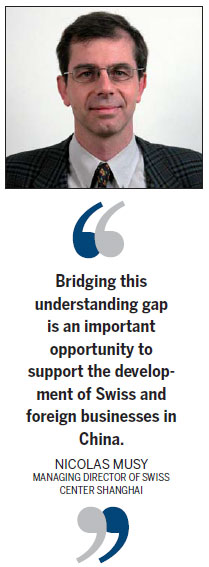Antitrust inquiries fail to faze Swiss
Updated: 2014-08-29 07:23
By Zhang Chunyan(China Daily Europe)
|
|||||||||||
Firms from Switzerland won't be affected much if global norms followed, head of Shanghai center says
Recent antitrust investigations of foreign companies in China have sparked concern among many European companies, but not all foreign business interests are as worried.
The head of the nonprofit organization Swiss Center Shanghai says he is not too concerned as long as China's anti-monopoly enforcement follows international norms.
|
Experts say Swiss companies will be little affected by China's anti-monopoly crackdown. Provided to China Daily |
Managing director Nicolas Musy of the center says Swiss companies will not be affected much if China complies with international anti-monopoly practices.
Founded in 2000, Swiss Center Shanghai is the largest cluster of Swiss businesses in Asia, where it helps with business setup, expansion and operations management.
The concern of Swiss companies would be whether the enforcement of the antitrust law was fair and whether it could create a competitive disadvantage for Swiss or other foreign companies, Musy says. That may happen if Chinese companies, particularly state-owned ones, find ways to partly avoid the anti-monopoly law while it is applied strictly to foreign companies, he says.
But Musy says Swiss companies remain confident about their businesses in China over the next five years, and almost two-thirds of Swiss companies plan to increase investment in the country.
Chinese authorities say the anti-monopoly law is being applied to both domestic and foreign firms with the aim of protecting consumers.
Antitrust investigations in the car and telecommunications sectors have spread to other industries, including a number of cement and medical companies.

Most major global automakers, including General Motors, BMW, Volkswagen's Audi division, Daimler's Mercedes-Benz, Tata Motors' Jaguar Land Rover, Fiat's Chrysler as well as Toyota and Honda, have been targeted in China's antitrust investigations. Most have announced price cuts for vehicles or spare parts in the past two months.
The six-year-old anti-monopoly law stipulates fines of between 1 and 10 percent of a company's revenues for the previous year for anti-competitive practices.
A National Development and Reform Commission official says that the investigations, some of which began in 2011, are not aimed at any specific type of industry or a specific country.
Investigations in many industries started with domestic companies and then spread to foreign companies, the commission says.
Many well-known Swiss companies, such as food and beverage company Nestle, pharmaceutical company Novartis AG, and elevator and escalator manufacturer Schindler Group, have set up research and development and production centers in China.
Trade and investment between China and Switzerland have grown rapidly over the past 10 years, and Switzerland last year became the second European country after Iceland to sign a free trade agreement with China. China has become Switzerland's largest trading partner in Asia while Switzerland is China's seventh-largest trading partner in Europe and its sixth-largest source of foreign investment.
Sales and profits of Swiss companies in China have continued to grow this year. Expectations of annual profit growth have more than doubled since 2012, according to the Business in China 2014 survey recently conducted by the Swiss Center Shanghai and the China Europe International Business School.
"In 2014, Swiss firms in China expect, on average, a 5.6 percent growth in profit, up from 3.5 percent in 2013 and 2.6 percent in 2012," Musy says.
In 2012, Swiss foreign direct investments in China moved into the top 10 of foreign direct investments, amounting to $809 million in the January-October 2012 period.
About 400 Swiss enterprises have established over 900 affiliated branches or agencies in China, according to the Swiss embassy in Beijing says.
Analysts say that Switzerland needs the great potential of the Chinese market to balance out its own challenges, such as a very limited domestic market.
Swiss and European small to medium-sized enterprises in China "are now more than ever seeing higher percentages of global sales generated in China", says Musy. In the Business in China survey, companies with fewer than 300 employees worldwide were counted as small to medium-sized enterprises.
"On average, all companies see their sales and profits improving in 2014," Musy says. "Respondents from SMEs see their profits increasing significantly faster than their colleagues from larger firms."
The survey is based on responses from more than 1,000 companies and is the only survey that collected responses from Chinese as well as foreign companies in China. The survey had responses from 104 Swiss firms in China.
"A possible reason for the strong success of SMEs is probably an environment that has a lower level of competition," Musy says.
"This lower level of competition and challenges could well be due to the SMEs' very nature of doing business, focusing on niches."
Based on profit and revenue picture, 64 percent of the Swiss companies planned to increase investment in China this year and more than half of them considered China among the top three investment destinations, the survey found.
Experts say Swiss companies have been successfully investing in China because they have extensive knowledge and experience to offer such as in sustainable development, green technology, innovation and vocational training.
All of these are important for China's development, and the economies of Switzerland and China are highly complementary, experts say.
The survey also found that the key management challenge for international companies in China remained finding and retaining talented employees, Musy says.
"As a consequence, human resources remain the central element for success, as it has been since we started surveying companies seven years ago," Musy says.
The HR challenge has, however, eased since last year. A bit over 60 percent of Swiss companies mentioned it while it was close to 80 percent a year before.
But, for the second year in a row, "Lack of understanding and support from the head office" was the second most important management challenge for international companies and an issue for 30 percent of them, the survey found.
This confirms the difference in perception of the managers seeing China from abroad and those managing in China.
"Bridging this understanding gap is an important opportunity to support the development of Swiss and foreign businesses in China," Musy says.
International companies in China now perceive local private players as their greatest competitors, a marked shift from the past years, when respondents reported international companies as the main competition.
This perspective is shared by Chinese companies, which see Chinese private companies as their most important competitors by far.
"Competition from private Chinese companies will most likely become fiercer as the Chinese government is due to support the private sector with more incentives as part of its economic reform agenda," Musy says.
zhangchunyan@chinadaily.com.cn
(China Daily European Weekly 08/29/2014 page22)
Today's Top News
Obama says 'no IS strategy yet'
China calls for ceasefire in Ukraine
British PM stresses advantages for Scotland to stay in Britain
Girl, 9, kills shooting range instructor
IMF chief Lagarde investigated in graft case
1,400 children exploited in UK town
China, Russia enhance military ties
Turkish FM elected as premier
Hot Topics
Lunar probe , China growth forecasts, Emission rules get tougher, China seen through 'colored lens', International board,
Editor's Picks

|

|

|

|

|

|






